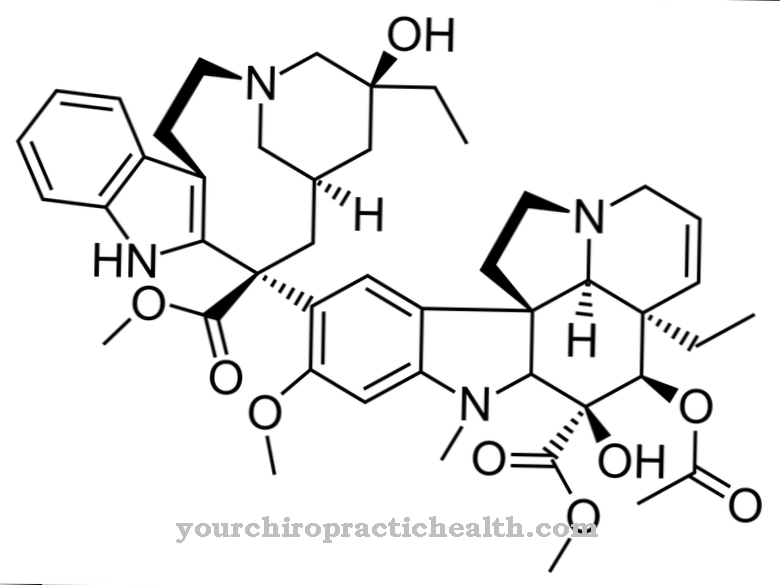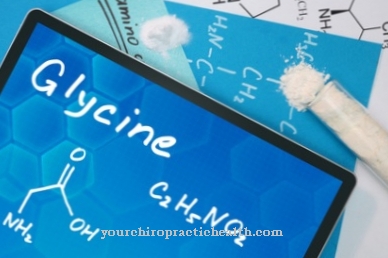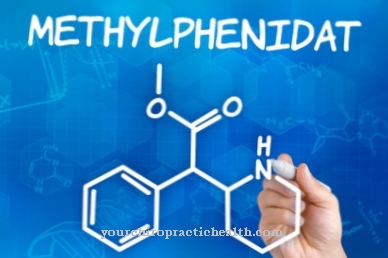Aluminum hydroxide is a chemical compound that occurs naturally in various minerals. It has the empirical formula Al (OH) 3. Aluminum hydroxide is used in gastroenterology, nephrology and immunology.
What is aluminum hydroxide?

Aluminum hydroxide belongs to the aluminum compounds from the chemical group of hydroxides. Several modifications of Al (OH) 3 are known. This includes the monoclinic modification, also common under the name of the mineral gibbsite.
There is also the hexagonal (mineral bayerite) and triclinic (mineral north strandite) modification. In addition, a variant that uses less water is known, the aluminum metahydroxide. It exists in the variants of the mineral diaspore or the mineral boehmite in orthorhombic form (crystal system). The aluminum minerals gibbsite and boehmite occur naturally in the aluminum ore bauxite. The chemical compound aluminum hydroxide has an amphoteric character.
If it works together with bases, it develops aluminates. In contrast, aluminum hydroxide reacts with acids to form aluminum salt solutions. The rate of reaction of the aluminum hydroxide depends on the modifications involved. The solubility in acid is correspondingly higher possible. Aluminum hydroxide is not soluble in water. A white material that is not flammable.
Pharmacological effect
As a component of basic substances, aluminum hydroxide is used in gastroenterology to neutralize gastric acid. It has a constipating effect on the intestines. This is why it is often used in conjunction with magnesium carbonate or magnesium hydroxide, as these substances act as a laxative.
Aluminum hydroxide acts as an acid inhibitor. It reacts with stomach acid to form soluble complexes. The mixture with magnesium hydroxide also leads to prolonged acid inhibition. The combination of these hydroxides is used when symptoms are caused by excess acid in the stomach. For example, for heartburn or stomach ulcers. Aluminum hydroxide is also used when the kidneys are diseased.
It is used as a phosphate binder for dialysis patients. Aluminum hydroxide is very effective in eliminating phosphate from blood plasma. However, with long-term use, aluminum hydroxide has negative effects on bone metabolism and brain chemistry. Therefore it is only used for a short time when the phosphate level is too high. Aluminum hydroxide is also used in immunology. It serves as an adjuvant that can make a vaccine more effective.
Aluminum hydroxide prevents precipitation, in which the vaccine proteins precipitate in a solution and appear as a solid precipitate. Accumulation on the ampoule wall is thus avoided. The vaccine can be stored for longer. Then aluminum hydroxide delays the effect as a depot after the vaccination. It causes the immune system to work harder at the injection site. In addition, aluminum hydroxide is also of industrial importance. It is the most important mineral fire retardant in the world.
Medical application & use
Various aluminum compounds, including aluminum hydroxide, are used in medicine to neutralize stomach acid. It always works in combination, as an appropriate aid. Aluminum hydroxide is also used for dialysis patients because it binds phosphate.
With a correspondingly restricted kidney function, phosphate cannot be broken down in the urine. However, it is ingested with food and is therefore removed using aluminum hydroxide. According to some studies, aluminum hydroxide has bad effects on other parts of the body's metabolism after a few weeks of ingestion. Therefore, the treatment with aluminum hydroxide is limited to a maximum of 4 weeks. Aluminum hydroxide is rarely used in vaccines. It is used in approved vaccines in an amount ranging from 0.2 to 2.4 mg. This means that the amount used is significantly lower than in many foods.
In the dosages used, aluminum hydroxide is not toxic. It only causes local tissue irritation during vaccination. Instead of aluminum hydroxide, a newer additive such as squalene is often used. It is also a potentiator for vaccines. However, active enhancers for vaccines are generally controversial by anti-vaccines. Aluminum hydroxide clearly helps to reduce the number of vaccinations, as it increases the effectiveness of the individual vaccination accordingly.
Risks & side effects
Aluminum hydroxide can cause harmful side effects in vaccines. It is a multitude of inflammations of the muscle connective tissue, also called macrophagic myofasciitis. It develops near vaccination sites.
























.jpg)



